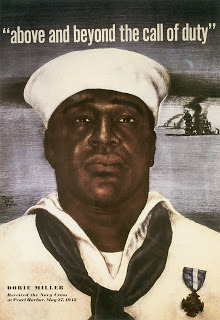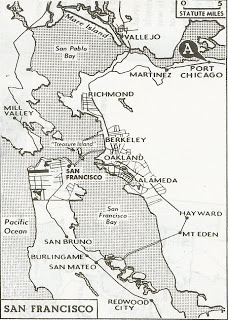Sarah Sundin's Blog, page 503
October 9, 2011
Today in World War II History
70 Years Ago—Oct. 9, 1941: Luftwaffe bomb pierces dome of St. Paul's Cathedral in London, destroys high altar. President Arias of Panama overthrown in bloodless coup.
Published on October 09, 2011 03:00
October 8, 2011
Today in World War II History
70 Years Ago—Oct. 8, 1941: Germans take Orel, key city south of Moscow. Chinese drive Japanese out of Changsha area.
Published on October 08, 2011 03:00
October 7, 2011
Today in World War II History
70 Years Ago—Oct. 7, 1941: Stalin lifts ban on religion to boost morale in USSR as Germans advance. Germans break through Vyazma defense line in Russia. Due to parliamentary elections, Australia's Prime Minister Arthur Fadden replaced by John Curtin.
Published on October 07, 2011 03:00
October 6, 2011
The Call? It's for You!
 "Leave your country, your people and your father's household and go to the land I will show you." When God spoke those words to Abram in Genesis 12:1, perhaps He tickled a latent dream in Abram's heart. Perhaps He scared the man.
"Leave your country, your people and your father's household and go to the land I will show you." When God spoke those words to Abram in Genesis 12:1, perhaps He tickled a latent dream in Abram's heart. Perhaps He scared the man.While the Bible doesn't mention Abram's emotional reaction, it does chronicle his action. "So Abram left, as the Lord had told him" Genesis 12:4. He obeyed, and God rewarded his obedience with multiple blessings.
The Lord calls us all. Sometimes He issues "big" calls to a new ministry or mission field, and frequently He issues "little"—but no less important—calls to help others, live godly lives, and walk more closely with Him.
God's calls produce a variety of emotions—fear, doubt, excitement, and awe jumble together in our minds. But our emotions don't matter as much as our actions. We must obey.
Obedience requires great faith. God often calls us to a task we don't think we can handle. We have to trust Him to prepare us, to give us the strength and ability, and most importantly—to work through us.
The blessings of obedience may be immediate, but even if we don't see blessings until we're in heaven, obedience to God's call is worth it.
How have you experienced God's call in your life? Have you seen the blessings of obedience?
Published on October 06, 2011 05:00
Today in World War II History
70 Years Ago—Oct. 6, 1941: Germans take Bryansk, south of Moscow. In World Series, New York Yankees defeat Brooklyn Dodgers four games to one.
Published on October 06, 2011 03:00
October 5, 2011
Today in World War II History
70 Years Ago—Oct. 5, 1941: Feldmarshal Paul von Kleist named commander of German First Panzer Army, Gen. Heinz Guderian over Second Panzer Army.
Published on October 05, 2011 03:00
October 3, 2011
The Port Chicago Disaster - Introduction
 In the worst Home Front disaster of World War II, an explosion at the Naval Magazine in Port Chicago, California on July 17, 1944 killed 320 men, 202 of whom were black. The tragedy was followed by a work stoppage and a controversial mutiny trial. This sent ripples of change through the segregated armed forces.
In the worst Home Front disaster of World War II, an explosion at the Naval Magazine in Port Chicago, California on July 17, 1944 killed 320 men, 202 of whom were black. The tragedy was followed by a work stoppage and a controversial mutiny trial. This sent ripples of change through the segregated armed forces. Despite its significance, few people have heard about Port Chicago. I included these events in my third novel, Blue Skies Tomorrow, and over the next few weeks, I'll discuss the situation in the armed forces and at Port Chicago, the explosion, work stoppage, trial, and aftermath.
Segregation of the Armed Forces in World War II
All branches of the U.S. armed forces were segregated during World War II. Jim Crow rules were followed, supposedly so as not to offend the sensibilities of white Southerners. Blacks served in separate units and used separate barracks, mess halls, recreational facilities, and transportation.
In 1940, the Army had few commissioned black officers, and the Navy had none. Due to paternalistic attitudes at the time, blacks usually served under white officers, often from the South. The rationale was that Southerners had a "special understanding" of how to work with blacks.
In the Army, the bulk of black men served in Quartermasters or Engineers, and rarely in combat units. In 1940, all the blacks in the Navy served in the Steward's Branch (mess).
These conditions were difficult to bear, especially for men from northern or western states, who had never lived under Jim Crow laws.
 Slow Gains During the War
Slow Gains During the WarAfter the United States instituted the peacetime draft on September 16, 1940, leaders from the NAACP and other black organizations met with President Roosevelt on September 27 to air their grievances about segregation in the military. Roosevelt responded on October 9 by allowing blacks to become commissioned officers—over black units only—but he retained segregation. He followed up by promoting Benjamin O. Davis Sr. to brigadier general, the Army's first black general. (Davis's son, Benjamin O. Davis Jr. would later lead the Tuskegee Airmen).
One of the nation's first war heroes was a black man. On December 7, 1941, Mess Attendant Second Class Doris "Dorie" Miller (pictured in the poster) was collecting laundry on board the USS West Virginia in Pearl Harbor. The Japanese attacked. Miller reported to his battle station, an antiaircraft battery amidships. Miller carried wounded sailors to safety, aided the mortally wounded captain, and manned a .50 caliber machine gun—a weapon he'd never been trained to use—and was credited with downing a Japanese fighter plane. For his bravery, he received the Navy Cross on May 27, 1942, the first black man to do so.
On February 7, 1942, the Pittsburgh Courier, the nation's foremost black newspaper, announced the "Double V Campaign" to fight for victory and freedom at home as well as abroad.
As of June 1, 1942, blacks were allowed to enlist in the Navy for general service, not just the mess. However, they were restricted to work in Construction Battalions (the Seabees), in ammunition loading, and to stateside duties. On July 12, 1943, the Navy allowed blacks to be rated and promoted on the same basis as whites, but not until March 17, 1944 did the first twelve black officers enter service in the Navy.
These minor gains did little to appease. In the summer of 1943, race riots sprang up around the nation—from Los Angeles to Harlem to Detroit to Mobile.
 Naval Magazine, Port Chicago
Naval Magazine, Port ChicagoThe Naval Ammunitions Depot at Mare Island, Vallejo, California provided a large quantity of supplies for the Pacific Fleet. A subcommand of Mare Island was established at nearby Port Chicago on January 28, 1942. Construction soon began, and the first ship moored on December 8, 1942.
Port Chicago lies by the deep water of Suisun Bay, where the Sacramento and San Joaquin Rivers merge before entering San Francisco Bay. The area was sparsely populated at the time, and the little town of Port Chicago (population 1000), was served by two transcontinental railroads, the Southern Pacific and the Santa Fe.
A single wooden pier allowed for one cargo ship to be loaded at a time. This was widened to twenty feet as of May 10, 1944, which allowed two ships to be loaded simultaneously.
Conditions at Port Chicago
At Port Chicago, eight divisions of 100-125 men worked around the clock. All the men working as stevedores (ammunition loading) were black, as were the petty officers. All commissioned officers and Marine guards were white.
The enlisted men arrived straight from basic training centers without any training in handling munitions. In addition, none of the officers had munitions handling experience. Only two lectures on safety were given before the explosion.
The officers instituted competitions between divisions, offering free movies to the fastest group. There were also reports of betting among the officers. These conditions did not foster safety.
Morale was low at Port Chicago. The segregation in the Navy, coupled with the inability to earn promotions or specialized ratings led to an apathetic attitude for many of the men. In addition, they earned lower pay than civilian stevedores. Not until June 1944 did the men have recreational facilities on the base, and no military transport was provided to Oakland or San Francisco for the men's leaves.
Not all the men complained. Some were grateful for the opportunity to prove their worth through service. And one common complaint only proved the men's patriotism—they wanted the right to go to combat and fight for their country.
Sources:
MacGregor, Morris J. Jr. Integration of the Armed Forces 1940-1965. Washington DC: Center of Military History, United States Army, 1985. On U.S. Army Center of Military History website. Accessed 2 October 2011. http://www.history.army.mil/books/integration/IAF-FM.htm
Allen, Robert L. The Port Chicago Mutiny. Berkeley CA: Heyday Books, 2006.
War Time History of U.S. Naval Magazine, Port Chicago, California. Washington DC: US Navy Bureau of Ordnance, 5 December 1945. On Naval Historical Center website. Accessed 2 October 2011. http://www.history.navy.mil/faqs/faq80-3d.htm
Published on October 03, 2011 17:00
October 2, 2011
Today in World War II History
70 Years Ago—Oct. 2, 1941: Germans launch offensive toward Moscow. First deaths due to starvation reported in besieged Leningrad.
Published on October 02, 2011 03:00
October 1, 2011
Today in World War II History
70 Years Ago—Oct. 1, 1941: US signs contract to send military aircraft to USSR (15,000 sent during war).
Published on October 01, 2011 03:00
September 30, 2011
Today in World War II History
70 Years Ago—Sept. 30, 1941: RAF withdraws US-made B-17Cs from combat due to problems with armor and systems freezing.
Published on September 30, 2011 03:00



